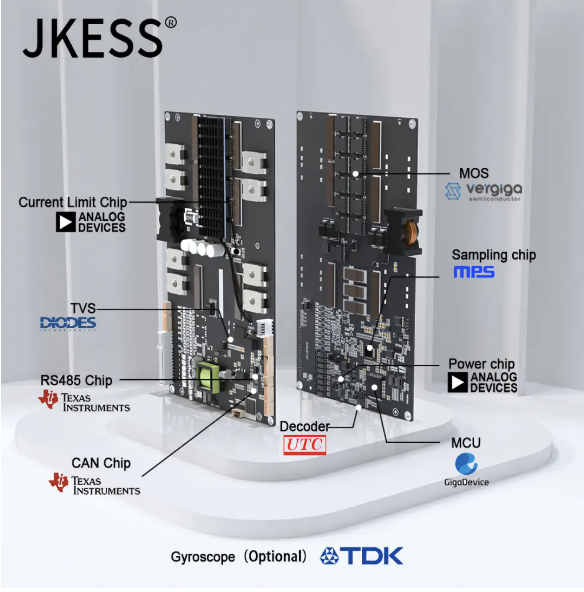ການເພີ່ມປະສິດທິພາບການຈັດການພະລັງງານດ້ວຍວິທີແກ້ໄຂ BMS ທີ່ຖືກອອກແບບມາຢ່າງເຫມາະສົມ
ໃນຍຸກປັດຈຸບັນຂອງພາກພື້ນພາຍໃນອຸດສາຫະກໍາ ແລະ ພາກພື້ນພາຍໃນການຄ້າ, ການຈັດການພະລັງງານຢ່າງມີປະສິດທິພາບເປັນສິ່ງຈໍາເປັນສໍາລັບການຫຼຸດຜ່ອນຕົ້ນທຶນການດໍາເນີນງານ ແລະ ການປັບປຸງຄວາມຍືນຍົງ. ລະບົບການຈັດການແບັດເຕີຣີ (BMS) ເຊິ່ງມີບົດບາດສໍາຄັນໃນການຕິດຕາມ, ຄວບຄຸມ ແລະ ເພີ່ມປະສິດທິພາບລະບົບເກັບຮັກສາພະລັງງານ, ເພື່ອຮັບປະກັນປະສິດທິພາບ ແລະ ຄວາມປອດໄພທີ່ເຊື່ອຖືໄດ້. ບັນດາບໍລິສັດເຊັ່ນ: JKESS Electronic Technology Co., Ltd., ທີ່ມີຄວາມຊໍານິຊໍານານດ້ານ ວິທີແກ້ໄຂ BMS ແລະ ລະບົບເກັບຮັກສາພະລັງງານ, ສະເໜີວິທີແກ້ໄຂທີ່ຖືກອອກແບບມາຢ່າງເຫມາະສົມເພື່ອຕອບສະໜອງຄວາມຕ້ອງການທີ່ຫຼາກຫຼາຍຂອງການນໍາໃຊ້ພະລັງງານໃນພາກພື້ນພາຍໃນອຸດສາຫະກໍາ ແລະ ພາກພື້ນພາຍໃນການຄ້າ. ໂດຍການປະສົມປະສານ R&D ທີ່ທັນສະໄໝ, ການຜະລິດທີ່ມີຄຸນນະພາບສູງ ແລະ ປະສົບການໃນລະດັບໂລກ, ວິທີແກ້ໄຂເຫຼົ່ານີ້ສະໜັບສະໜູນປະສິດທິພາບດ້ານພະລັງງານ, ຄວາມໝັ້ນຄົງໃນການດໍາເນີນງານ ແລະ ການນໍາໃຊ້ພະລັງງານຢ່າງມີປັນຍາໃນການນໍາໃຊ້ພະລັງງານ C&I ໃນຂົງເຂດທີ່ຫຼາກຫຼາຍ.
ປະໂຫຍດຫຼັກຂອງວິທີແກ້ໄຂ BMS ທີ່ຖືກອອກແບບມາຢ່າງເຫມາະສົມ
ການຮັບປະກັນການເກັບຮັກສາພະລັງງານທີ່ເຊື່ອຖືໄດ້
ລະບົບການຈັດການແບັດເຕີ່ຊ່ວຍໃຫ້ລະບົບການເກັບພະລັງງານດຳເນີນງານຢ່າງມີປະສິດທິພາບ ແລະ ປອດໄພ. ແກ້ໄຂບັນຫາ BMS ທີ່ຖືກອອກແບບມາເພື່ອຕິດຕາມຄ່າໄຟຟ້າ, ຄ່າກະແສໄຟຟ້າ ແລະ ອຸນຫະພູມ, ເພື່ອປ້ອງກັນບັນຫາການໄອ້ໄຟເກີນ, ການໃຊ້ໄຟໝົດເກີນ ແລະ ບັນຫາອື່ນໆທີ່ອາດຈະສົ່ງຜົນກະທົບຕໍ່ການເຮັດວຽກ. ສຳລັບການນຳໃຊ້ພະລັງງານໃນເຂດພາບພິເສດ ແລະ ອຸດສາຫະກຳ, ແກ້ໄຂບັນຫາ BMS ທີ່ເຊື່ອຖືໄດ້ຊ່ວຍຫຼຸດຜ່ອນການລົ້ມເຫຼວ, ຍືດອາຍຸການໃຊ້ງານຂອງແບັດເຕີ່, ແລະ ເພີ່ມປະສິດທິພາບໃນການນຳໃຊ້ພະລັງງານ. ບັນດາບໍລິສັດເຊັ່ນ JKESS ສະເໜີລະບົບທີ່ຖືກອອກແບບມາເພື່ອຕອບສະໜອງຄວາມຕ້ອງການດຳເນີນງານທີ່ເປັນສະເພາະ, ເຮັດໃຫ້ທຸລະກິດສາມາດຮັກສາການສະໜອງພະລັງງານ ແລະ ຄວາມໝັ້ນຄົງຢ່າງຕໍ່ເນື່ອງ.
ເສີມຂະຫຍາຍປະສິດທິພາບການດໍາເນີນງານ
ປະສິດທິພາບດ້ານພະລັງງານມີຄວາມສຳຄັນໃນການນຳໃຊ້ເພື່ອຈຸດປະສົງດ້ານພາຄະນິດແລະອຸດສາຫະກຳ. ວິທີແກ້ໄຂ BMS ທີ່ຖືກອອກແບບຢ່າງເໝາະສົມ ຜະສົມຜະສານການຄວບຄຸມຢ່າງມີປັນຍາ, ການຕິດຕາມແບບເວລາຈິງ ແລະ ການວິເຄາະຄາດເດົາເພື່ອຍົກສູງປະສິດທິພາບໃນການດຳເນີນງານ. ໂດຍການເຮັດໃຫ້ການນຳໃຊ້ຖ່ານໄຟມີປະສິດທິພາບສູງສຸດ, ລະບົບເຫຼົ່ານີ້ຊ່ວຍໃຫ້ການຈັດການພະລັງງານດີຂຶ້ນ, ຫຼຸດຜ່ອນການສູນເສຍ ແລະ ຫຼຸດຄ່າໃຊ້ຈ່າຍດ້ານໄຟຟ້າ. ຜູ້ໃຊ້ພະລັງງານດ້ານອຸດສາຫະກຳໄດ້ຮັບປະໂຫຍດຈາກຄວາມແມ່ນຢຳ ແລະ ຄວາມຍືດຍຸ່ນຂອງວິທີແກ້ໄຂ BMS ທີ່ທັນສະໄໝ, ເຊິ່ງສາມາດຄວບຄຸມພະລັງງານທີ່ຊັບຊ້ອນໄດ້ໃນຫຼາຍລະບົບ ແລະ ສິ່ງອຳນວຍຄວາມສະດວກ.
ການປັບປຸງຄວາມປອດໄພ ແລະ ຄວາມໜ້າເຊື່ອຖື
ຄວາມປອດໄພເປັນຂໍ້ກັງວົນຫຼັກໃນການຈັດເກັບພະລັງງານ ແລະ ການຈັດການແບັດເຕີຣີ. ວິທີແກ້ໄຂ BMS ທີ່ມີຄຸນນະພາບສູງຊ່ວຍປ້ອງກັນການຮ້ອນເກີນ, ລວງຈະເລີຍສັ້ນ ແລະ ອັນຕະລາຍອື່ນໆ, ເພື່ອຮັບປະກັນການດຳເນີນງານຢ່າງປອດໄພ. ຄວາມໜ້າເຊື່ອຖືກໍຖືກປັບປຸງຜ່ານການຕິດຕາມຢ່າງຕໍ່ເນື່ອງ ແລະ ການຄວບຄຸມທີ່ປັບຕົວໄດ້, ເຮັດໃຫ້ລະບົບພະລັງງານເພື່ອການຄ້າ ແລະ ອຸດສາຫະກໍາສາມາດຕອບສະໜອງຢ່າງວ່ອງໄວຕໍ່ການປ່ຽນແປງຂອງສະພາບການ. JKESS ສຸມໃສ່ລະບົບການຈັດເກັບພະລັງງານທີ່ມີວິທີແກ້ໄຂ BMS ຕິດຕັ້ງພາຍໃນ, ໃຫ້ການປົກປ້ອງຢ່າງຄົບຖ້ວນສຳລັບການນຳໃຊ້ພະລັງງານ C&I ທີ່ຫຼາກຫຼາຍ.
ຄຸນສົມບັດທີ່ຄວນພິຈາລະນາໃນວິທີແກ້ໄຂ BMS
ການຕິດຕາມ ແລະ ການຄວບຄຸມຂັ້ນສູງ
ວິທີແກ້ໄຂ BMS ທີ່ມີປະສິດທິຜົນໃຫ້ການຕິດຕາມ ແລະ ການຄວບຄຸມຢ່າງຄົບຖ້ວນຕໍ່ລະບົບການເກັບຮັກສາພະລັງງານ. ພາລາມິເຕີຕ່າງໆ ເຊັ່ນ: ໂວນ, ອຸນຫະພູມ, ຄ່າປັດຈຸບັນ ແລະ ສະຖານະການຊາກ໌ ຖືກຕິດຕາມຢ່າງຕໍ່ເນື່ອງ, ເຮັດໃຫ້ຜູ້ດຳເນີນງານສາມາດຕັດສິນໃຈໄດ້ຢ່າງມີຂໍ້ມູນ. ລະບົບອັລກະຈິດທີ່ມີສະຕິຮັບປະກັນການຊາກ໌ ແລະ ຄ່າຍປັດຈຸບັນທີ່ສົມດຸນໃນທຸກໆເຊວລ້ຽງໄຟຟ້າ, ຊ່ວຍປັບປຸງປະສິດທິພາບ ແລະ ອາຍຸການໃຊ້ງານ. ວິທີແກ້ໄຂ BMS ລະດັບສູງເປັນສິ່ງຈຳເປັນສຳລັບການນຳໃຊ້ພະລັງງານ C&I ທີ່ຕ້ອງການການສະໜອງພະລັງງານທີ່ເຊື່ອຖືໄດ້ ແລະ ບໍ່ມີການຂາດ.
ຄວາມສາມາດຂະຫຍາຍແລະປັບແຕ່ງ
ຄວາມຕ້ອງການພະລັງງານດ້ານພານິຊະຍະກຳ ແລະ ອຸດສາຫະກຳແມ່ນແຕກຕ່າງກັນຢ່າງກວ້າງຂວາງ, ຕ້ອງການວິທີແກ້ໄຂທີ່ມີຄວາມຍືດຫຍຸ່ນ ແລະ ສາມາດຂະຫຍາຍຂະຫນາດໄດ້. ລະບົບ BMS ທີ່ຖືກອອກແບບມາເພື່ອຈຸດປະສົງສະເພາະສາມາດປັບແຕ່ງໄດ້ຕາມຄວາມຈຸຂອງແບັດເຕີຣີ, ຮູບແບບ ແລະ ຄວາມຕ້ອງການພະລັງງານທີ່ແຕກຕ່າງກັນ. ຄວາມສາມາດໃນການຂະຫຍາຍຂະຫນາດຮັບປະກັນວ່າລະບົບການເກັບຮັກສາພະລັງງານສາມາດເຕີບໂຕໄປພ້ອມກັບຄວາມຕ້ອງການທຸລະກິດ, ສາມາດຂະຫຍາຍຕົວໄດ້ໂດຍບໍ່ມີຜົນກະທົບຕໍ່ປະສິດທິພາບ. ຜູ້ສະຫນອງເຊັ່ນ JKESS ມີການອອກແບບແບບມົດູລາ (modular) ທີ່ອະນຸຍາດໃຫ້ທຸລະກິດສາມາດປັບປຸງວິທີແກ້ໄຂ BMS ໃຫ້ເຫມາະສົມກັບສະພາບແວດລ້ອມການດຳເນີນງານຂອງພວກເຂົາ.
ການເຊື່ອມຕໍ່ກັບລະບົບການຈັດການພະລັງງານ
ການເຊື່ອມຕໍ່ກັບລະບົບການຈັດການພະລັງງານທີ່ກວ້າງຂວາງຂຶ້ນຈະເຮັດໃຫ້ແບັດເຕີຣີ່ BMS ມີຄຸນຄ່າຫຼາຍຂຶ້ນ. ໂດຍການເຊື່ອມຕໍ່ລະບົບການຈັດການແບັດເຕີຣີ່ເຂົ້າກັບການຕິດຕາມພະລັງງານຂອງສະຖານທີ່, ກ້ອງໄຟຟ້າອັດສະຈັກ ແລະ ລະບົບຕອບສະໜອງຄວາມຕ້ອງການ, ຜູ້ດຳເນີນງານສາມາດປັບປຸງປະສິດທິພາບ ແລະ ປະຢັດຄ່າໃຊ້ຈ່າຍໄດ້ສູງສຸດ. ການນຳໃຊ້ພະລັງງານໃນອຸດສາຫະກຳຈະໄດ້ຮັບຜົນປະໂຫຍດຈາກການເຊື່ອມຕໍ່ຢ່າງລຽບລຽງ, ເຊິ່ງອຳນວຍໃຫ້ການຄວບຄຸມແຫຼ່ງພະລັງງານຫຼາຍແບບຮ່ວມກັນ, ພະລັງງານທີ່ເຊື່ອຖືໄດ້ຫຼາຍຂຶ້ນ ແລະ ການນຳໃຊ້ພະລັງງານທີ່ຖືກເກັບໄວ້ຢ່າງມີປະສິດທິພາບ.
ການນຳໃຊ້ແບັດເຕີຣີ່ BMS ທີ່ຖືກອອກແບບສະເພາະໃນພະລັງງານ C&I
ການເກັບຮັກສາພະລັງງານທາງທຸລະກິດ
ໃນສະພາບແວດລ້ອມດ້ານການຄ້າ, ລະບົບການເກັບຮັກສາພະລັງງານທີ່ຮອງຮັບໂດຍແບັດເຕີຣີ່ BMS ທີ່ຖືກອອກແບບສະເພາະສາມາດໃຫ້ພະລັງງານສຳຮອງ, ການຫຼຸດຜ່ອນຈຸດສູງສຸດຂອງການໃຊ້ພະລັງງານ ແລະ ການດຸນດ່ຽງພະລັງງານ. ສູນການຄ້າ, ອາຄານຫ້ອງການ ແລະ ໂຮງໝໍ ຕ້ອງອີງໃສ່ການສະໜອງພະລັງງານທີ່ໝັ້ນຄົງເພື່ອຮັກສາການດຳເນີນງານ. ໂດຍການຕິດຕາມການໃຊ້ພະລັງງານ ແລະ ສຸຂະພາບແບັດເຕີຣີ່, ແບັດເຕີຣີ່ BMS ສາມາດຮັບປະກັນປະສິດທິພາບການເຮັດວຽກທີ່ສອດຄ່ອງກັນ ແລະ ປະສິດທິພາບໃນການດຳເນີນງານ, ຊ່ວຍຫຼຸດຜ່ອນຄ່າໃຊ້ຈ່າຍດ້ານພະລັງງານ ແລະ ປັບປຸງຄວາມຍືນຍົງ.
ການຈັດການພະລັງງານອຸດສາຫະກຳ
ໂຮງງານອຸດສາຫະກໍາມັກຈະປະເຊີນກັບຄວາມຕ້ອງການພະລັງງານສູງ ແລະ ແຜນການປະຕິບັດງານທີ່ສັບສົນ. BMS Solutions ຊ່ວຍໃນການຄຸ້ມຄອງລະບົບເກັບຮັກສາພະລັງງານຂະ ຫນາດ ໃຫຍ່, ຮັບປະກັນປະສິດທິພາບທີ່ດີທີ່ສຸດໃນລະຫວ່າງການໂຫຼດສູງສຸດແລະການຜະລິດຢ່າງຕໍ່ເນື່ອງ. ວິທີແກ້ໄຂ BMS ທີ່ປັບແຕ່ງສາມາດປະສານງານໂມດູນແບັດເຕີຣີຫຼາຍຢ່າງ, ປັບປຸງຮອບທ່າສາກໄຟ, ແລະສະ ຫນອງ ການແຈ້ງເຕືອນການ ບໍາ ລຸງຮັກສາແບບຄາດຄະເນ, ຊ່ວຍໃຫ້ອຸດສາຫະ ກໍາ ສາມາດຮັກສາການສະ ຫນອງ ພະລັງງານທີ່ ຫນ້າ ເຊື່ອຖືແລະຫຼຸດຜ່ອນການຢຸດເຊົາການ ດໍາ ເນີນງານ.
ການເຊື່ອມໂຍງພະລັງງານທີ່ສາມາດທົດແທນໄດ້
ລະບົບພະລັງງານທີ່ສາມາດທົດແທນໄດ້ ເຊັ່ນ: ພະລັງງານແສງຕາເວັນ ແລະ ພະລັງງານລົມ ຕ້ອງການການເກັບຮັກສາພະລັງງານທີ່ແຂງແຮງ ເພື່ອໃຫ້ມີຄວາມສົມດຸນລະຫວ່າງການຜະລິດ ແລະ ການບໍລິໂພກ. BMS Solutions ຄຸ້ມຄອງລະບົບເກັບຮັກສາພະລັງງານເພື່ອເກັບຮັກສາພະລັງງານເກີນໄປແລະປ່ອຍມັນໃຫ້ມີປະສິດທິພາບເມື່ອ ຈໍາ ເປັນ. ຜູ້ໃຊ້ພະລັງງານທາງດ້ານການຄ້າ ແລະ ອຸດສາຫະກໍາ ສາມາດເພີ່ມການນໍາໃຊ້ພະລັງງານທີ່ສາມາດທົດແທນໄດ້ສູງສຸດ, ປັບປຸງຄວາມຫມັ້ນຄົງຂອງຕາຂ່າຍໄຟຟ້າ ແລະ ຫຼຸດຜ່ອນການເພິ່ງພາອາໄສແຫຼ່ງພະລັງງານແບບດັ້ງເດີມ. ບໍລິສັດຕ່າງໆເຊັ່ນ JKESS ໃຫ້ການແກ້ໄຂ BMS ທີ່ກ້າວຫນ້າ ທີ່ເຊື່ອມໂຍງເຂົ້າກັບລະບົບພະລັງງານທົດແທນຢ່າງບໍ່ມີຂາດແຄນ, ສະຫນັບສະຫນູນຍຸດທະສາດພະລັງງານທີ່ຍືນຍົງ.
ການເລືອກວິທີແກ້ໄຂ BMS ທີ່ເໝາະສົມ
ການປະເມີນຄວາມສາມາດດ້ານເຕັກນິກ
ການເລືອກວິທີແກ້ໄຂ BMS ທີ່ເໝາະສົມຕ້ອງໃຊ້ການປະເມີນຄວາມສາມາດດ້ານເຕັກນິກ, ລວມທັງຄວາມຖືກຕ້ອງໃນການຕິດຕາມ, ອະລະກິດທີ່ຄວບຄຸມ, ແລະ ຄວາມເຂົ້າກັນໄດ້ກັບລະບົບການຈັດເກັບພະລັງງານ. ລະບົບທີ່ມີຄຸນນະພາບສູງຮັບປະກັນການຈັດການພະລັງງານຢ່າງແນ່ນອນ, ຍືດອາຍຸການໃຊ້ງານຂອງແບັດເຕີຣີ, ແລະ ການດຳເນີນງານຢ່າງປອດໄພ. ຜູ້ສະໜອງທີ່ມີປະສົບການຫຼາຍ, ເຊັ່ນ JKESS, ສະເໜີວິທີແກ້ໄຂ BMS ທີ່ຕອບສະໜອງຄວາມຕ້ອງການດ້ານພະລັງງານໃນເຊິງພານິຊຍະ ແລະ ອຸດສາຫະກຳຢ່າງແນ່ນອນ ແລະ ເຊື່ອຖືໄດ້.
ພິຈາລະນາຄວາມຕ້ອງການດ້ານຄວາມຍືດຍຸ່ນ ແລະ ການປັບແຕ່ງ
ຄວາມຕ້ອງການດ້ານພະລັງງານຂອງທຸລະກິດມີການພັດທະນາໄປຕາມເວລາ, ດັ່ງນັ້ນຄວາມຍືດຍຸ່ນ ແລະ ການປັບແຕ່ງຈຶ່ງເປັນສິ່ງສຳຄັນ. ວິທີແກ້ໄຂ BMS ທີ່ຖືກປັບແຕ່ງໃຫ້ເໝາະສົມອະນຸຍາດໃຫ້ຜູ້ດຳເນີນງານຂະຫຍາຍລະບົບ ຫຼື ປັບປຸງຮູບແບບການຕັ້ງຄ່າໃຫ້ເຂົ້າກັບຄວາມຕ້ອງການດ້ານພະລັງງານທີ່ປ່ຽນແປງ. ຮູບແບບການອອກແບບທີ່ມີຄວາມຍືດຍຸ່ນຊ່ວຍໃຫ້ການເຊື່ອມຕໍ່ກັບພື້ນຖານໂຄງລ່າງດ້ານພະລັງງານທີ່ມີຢູ່ແລ້ວເປັນໄປຢ່າງລຽບງ່າຍ ແລະ ຫຼຸດຜ່ອນການລົບກວນໃນຂະນະທີ່ມີການອັບເກຣດ. ວິທີແກ້ໄຂ BMS ທີ່ສາມາດຂະຫຍາຍໄດ້ໃຫ້ຄຸນຄ່າໃນໄລຍະຍາວ ແລະ ຄວາມຍືດຍຸ່ນສຳລັບການນຳໃຊ້ພະລັງງານໃນເຊິງພານິຊຍະ ແລະ ອຸດສາຫະກຳ.
ປະເມີນການສະໜັບສະໜູນ ແລະ ບໍລິການຈາກຜູ້ສະໜອງ
ການສະໜັບສະໜູນຢ່າງຄົບຖ້ວນຈາກຜູ້ສະໜອງ ຮັບປະກັນປະສິດທິພາບ BMS ສູງສຸດ. ຜູ້ສະໜອງທີ່ໜ້າເຊື່ອຖືໃຫ້ຄວາມຊ່ວຍເຫຼືອດ້ານເຕັກນິກ, ຄຳແນະນຳກ່ຽວກັບການຕິດຕັ້ງ ແລະ ບໍລິການຫຼັງການຂາຍເພື່ອຮັກສາຄວາມໜ້າເຊື່ອຖືຂອງລະບົບພະລັງງານ. ທຸລະກິດໄດ້ຮັບປະໂຫຍດຈາກການຮ່ວມມືກັບຜູ້ຜະລິດທີ່ມີປະສົບການ ເຊິ່ງສະເໜີການຝຶກອົບຮົມ, ອະໄຫຼ່ແທນ ແລະ ການຊ່ວຍແກ້ໄຂບັນຫາ, ຮັບປະກັນການດຳເນີນງານ BMS ໄດ້ຢ່າງລຽບງ່າຍໃນທຸກໆການນຳໃຊ້ເພື່ອທຸລະກິດ ແລະ ອຸດສາຫະກຳ.
ຄຳຖາມທີ່ຖາມບໍ່ຍາກ
ຜົນປະໂຫຍດຫຼັກໆຂອງວິທີແກ້ໄຂ BMS ທີ່ຖືກອອກແບບສະເພາະສຳລັບພະລັງງານເພື່ອທຸລະກິດ ແລະ ອຸດສາຫະກຳ ມີຫຍັງແດ່?
ວິທີແກ້ໄຂ BMS ທີ່ຖືກອອກແບບສະເພາະ ຈະຊ່ວຍເພີ່ມປະສິດທິພາບຂອງຖ່ານໄຟ, ພັດທະນາປະສິດທິພາບໃນການດຳເນີນງານ ແລະ ຮັບປະກັນຄວາມປອດໄພ. ວິທີແກ້ໄຂເຫຼົ່ານີ້ສະເໜີຄວາມສາມາດໃນການຕິດຕາມແບບເວລາຈິງ, ການບຳລຸງຮັກສາແບບຄາດເດົາລ່ວງໜ້າ ແລະ ການຈັດການພະລັງງານ, ຊ່ວຍຫຼຸດຜ່ອນຕົ້ນທຶນ ແລະ ພັດທະນາຄວາມໜ້າເຊື່ອຖືສຳລັບການນຳໃຊ້ພະລັງງານ C&I.
ວິທີແກ້ໄຂ BMS ຊ່ວຍປັບປຸງປະສິດທິພາບຂອງລະບົບເກັບພະລັງງານໄດ້ແນວໃດ?
ວິທີແກ້ໄຂ BMS ຈະດຸນການໄອ້ສານ ແລະ ການປ່ອຍປະຈຸບັນ, ຕິດຕາມສຸຂະພາບຂອງຖ່ານໄຟ ແລະ ປ້ອງກັນການໄອ້ສານເກີນ ຫຼື ຮ້ອນເກີນໄປ. ລະບົບຄວບຄຸມອັດສະລິຍະພາບຈະຊ່ວຍເພີ່ມປະສິດທິພາບໃນການໃຊ້ພະລັງງານ, ຍືດອາຍຸການໃຊ້ງານຂອງຖ່ານໄຟ ແລະ ຮັກສາປະສິດທິພາບໃນການເຮັດວຽກຢ່າງຕໍ່ເນື່ອງໃນຂະແໜງການຄ້າ ແລະ ອຸດສາຫະກໍາ.
ເປັນຫຍັງການປັບແຕ່ງຈຶ່ງສໍາຄັນສໍາລັບການນໍາໃຊ້ພະລັງງານ C&I?
ຄວາມຕ້ອງການດ້ານພະລັງງານຂອງຂະແໜງການຄ້າ ແລະ ອຸດສາຫະກໍາແມ່ນແຕກຕ່າງກັນໄປຕາມຂະໜາດ, ຮູບແບບການໃຊ້ພະລັງງານ ແລະ ຄວາມສໍາຄັນໃນການດໍາເນີນງານ. ວິທີແກ້ໄຂ BMS ທີ່ສາມາດປັບແຕ່ງໄດ້ຊ່ວຍໃຫ້ທຸລະກິດສາມາດຈັດສົມປະສິດທິພາບຂອງການເກັບພະລັງງານກັບຄວາມຕ້ອງການໂດຍສະເພາະ, ຮັບປະກັນຄວາມໜ້າເຊື່ອຖື, ປະສິດທິພາບ ແລະ ຄຸນຄ່າໃນໄລຍະຍາວ.
ການເຊື່ອມຕໍ່ກັບລະບົບພະລັງງານທີ່ຍືນຍົງເຮັດວຽກແນວໃດ?
ວິທີແກ້ໄຂ BMS ຈະຄຸ້ມຄອງການເກັບ ແລະ ການປ່ອຍພະລັງງານຈາກແຫຼ່ງພະລັງງານທີ່ຍືນຍົງເຊັ່ນ: ແສງຕາເວັນ ຫຼື ລົມ. ໂດຍການຕິດຕາມສຸຂະພາບຖ່ານໄຟ, ສະຖານະການໄອ້ສານ ແລະ ຄວາມຕ້ອງການພະລັງງານ, ລະບົບເຫຼົ່ານີ້ຈະຮັບປະກັນວ່າພະລັງງານທີ່ຖືກເກັບໄວ້ຖືກນໍາໃຊ້ຢ່າງມີປະສິດທິພາບ, ຊ່ວຍສະໜັບສະໜູນການນໍາໃຊ້ພະລັງງານຢ່າງຍືນຍົງໃນຂະແໜງການຄ້າ ແລະ ອຸດສາຫະກໍາ.

